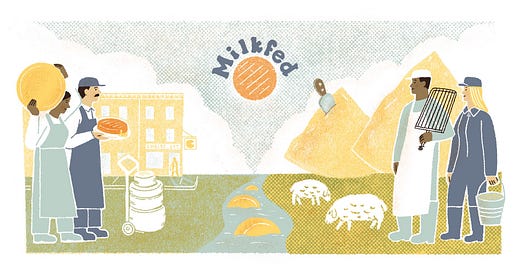You're invited to my cheese & climate webinar on April 21
And a meditation on our current climate moment
Hello. I am finally presenting my cheese and climate research in an easily accessible online format next Monday, and you are all invited.
Here are the deets:
WHAT: Cheese & Climate Change: Mitigating Impacts, Exploring Solutions, and Building Resilience Virtual Webinar & Discussion
WHEN: Monday, April 21 at 8pm Eastern
COST: $10 (your donation to the Daphne Zepos Teaching Endowment will support future cheese education grantees)
TICKETS: Get them here!
Here’s some quick backstory: In 2023, I applied for the Daphne Zepos Research Award, a then-$2500 (now $3000) grant that supports a cheese professional in researching a topic of their choice to present to the wider industry in some kind of educational medium. I chose cheese and climate change, a massive, wide-ranging, and somewhat controversial topic, and won the award. You can read my application vision here—pretty sure I won’t get all that done by June 2026, or ever, but go big or go home, right?
Winning this award was a huge blessing—as a freelance cheese creative who doesn’t fit neatly into a professional mold, I don’t get a lot of institutional approval or financial support, and this award was incredibly affirming that my perspective had something to offer the wider industry. It was also a curse, because I had chosen this broad yet thorny topic, and I spent the next several months driving myself nuts with research, much of which didn’t make it into the presentation I gave at the American Cheese Society conference last summer. (Spoiler alert: Some of these findings will be published here and in audio format in the near future.)
I also ran up against the limitations of the American artisan cheese industry’s conception of sustainability—saying the word “degrowth” in front of even the crunchiest small-scale cheesemakers and dairy farmers is going to provoke a knee-jerk reaction—and my limitations as a presenter to make some of these big ideas more digestible for that audience. I got a lot of positive feedback and also some pushback, which I was prepared for, and I knew I’d want to refine my messaging before presenting my research as a webinar.
But nothing about climate change is static. In the seven months since I presented my research, a lot has happened, unfortunately, that I’ve been able to add to my presentation or for us to talk about in the discussion portion of the virtual event. Flooding in Vermont, hurricanes in Western North Carolina, wildfires in Altadena.
With those events highlighting the urgency of adaptation and resilience measures in addition to climate mitigation, I had already planned on updating my webinar to focus more on those aspects of my research. But in the last three months, the federal government has gone all-in on climate change denial, slashing funding for climate research and reneging on legally binding funding contracts for climate projects with farmers and advocacy groups alike. Here in Pennsylvania, nonprofit organization Pasa had $55 million in USDA Climate Smart Commodities funding cut after they’d hired dozens of staff, many of them farmers, to help hundreds of producers throughout the Northeast with climate resilience projects.
I don’t have the answers for how to combat this in my research—if only. But these developments underscore that we are, more than ever, on our own when it comes to climate change. I don’t mean that in the toxic individualism prepper way, although it’s a good idea to plan ahead and do what you can to prepare for climate disasters most likely to affect your area. I mean that at the community level—neighborhoods, towns, cities. Within your industry or your supply chain. Thinking and talking and making plans, to the extent that you’re able, to protect ourselves and each other, to mitigate harm and suffering.
Amid all this, and everything else, we have to continue pushing back against climate denial and fascism and demanding accountability from our governments and from the fossil fuel industry. But we must also imagine new ways of existing, both to adapt to what’s coming our way as best we can and to one day leave behind the growth-at-all-costs systems that brought humanity to this existential crisis in the first place.
This hasn’t been the breezy, enticing invitation I wanted to send (or write) today. But by writing and talking about these things, maybe we can all feel a little less alone—and move through our climate anxiety to some form of acceptance that frees us from despair and paralysis and creates the space for necessary action.
Here’s that ticket link for next Monday’s webinar one more time. I’m excited to share my work and talk about these topics with you.




